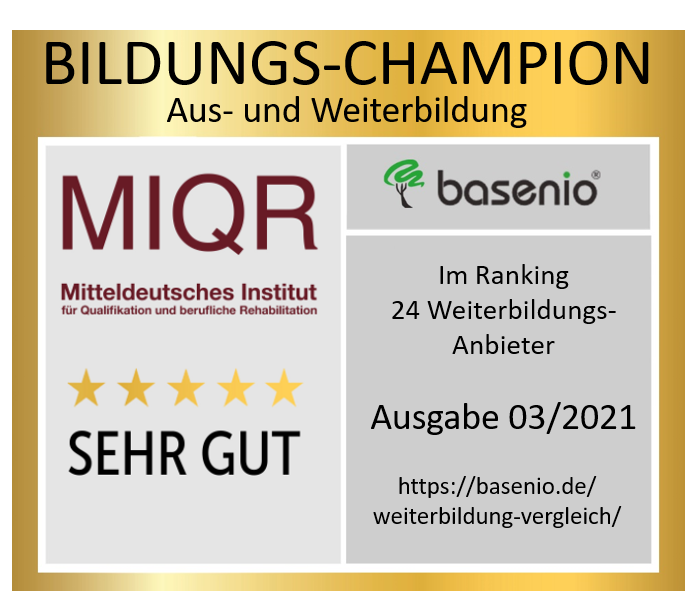Career changers | career | Opportunities | jobs
Professions for career changers with advancement and career opportunities
Reading time: approx. 25 minutes | Status: 23.09.2022/XNUMX/XNUMX | Author: S. Grober
The phrase "Newcomers welcome’ is no longer a rarity in job advertisements. Lateral entry - a term that describes a new type of employee - has become firmly anchored in our vocabulary. But how do you become a career changer and what chances do you have as such to make a successful career?
We from Central German Institute (MIQR) have dealt intensively with this topic and in this article we are going into the question of what prospects career changers have and in which sectors you can really get off to a good start professionally. Find out everything you need to know here as well as our TOP 5 tips for a successful new career start.
What does "lateral entrant" mean
People who are looking for a job that they have not learned are referred to as “lateral entrants”. They are not familiar with the industry, so they have no professional or academic training that prepares them for the respective profession. Instead, they manage to start work with important soft skills, extreme motivation, a strong interest in the job and voluntary further training.
Of course, the question arises as to how successful such a lateral entry is. Don't employers attach great importance to applicants having the necessary specialist skills? You can't say that in general. In today's working world, it is important to be able to adapt and always strive for (self-) optimization. Both the job descriptions and the requirements and work techniques are constantly changing. With all these changes on the labor market, it is not surprising that new career opportunities are also arising. With commitment and the will to regularly participate in further education and training, career changers can also be successful in a new professional field and make a career.
Why are career changers wanted?
For many companies, lateral entrants represent an opportunity to quickly cover any personnel requirements that arise and thus keep internal work processes running. Through targeted training, the support of mentors and executives and the extensive and personal teaching of the necessary skills, career changers can also effectively acquire comparable know-how to their trained colleagues. "Learning-by-doing" is the keyword here and usually proves to be very successful.
Good to know: The shortage of skilled workers inspires opportunities for lateral entrants. Take advantage of this circumstance and apply specifically for the professions that are most sought after!
How does a lateral entry succeed? – What you need to do beforehand
The labor market is open and offers those who are willing to learn and work many opportunities to advance professionally. Apply indiscriminately and hope for the best - but that doesn't work. Lateral entry must also be well planned in order to lead to professional success.
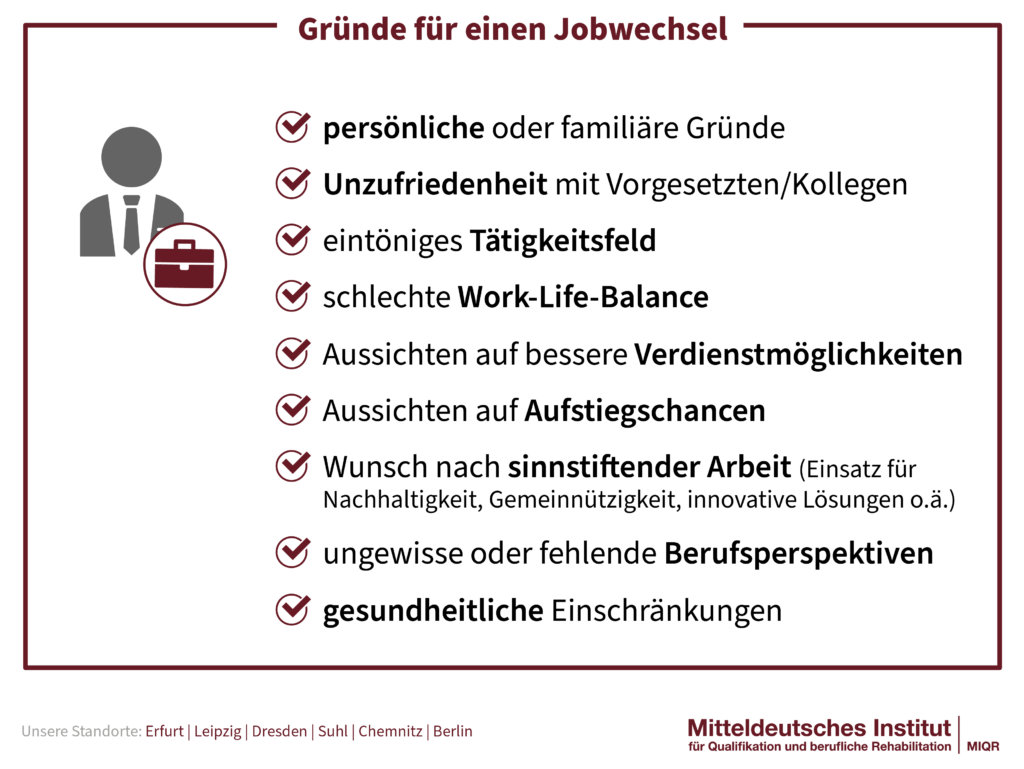
In order for you to succeed in lateral entry, you should consider various aspects. We have put together three different catalogs of questions so that you can prepare well for your new professional career.
Opinion on the current job
- Why did I originally apply for this position?
- What bothers me about my job?
- What areas of responsibility do I like in my current job?
- Which tasks do I definitely no longer want to take on?
- What am I particularly good at?
New job considerations
- what is my dream job
- What areas of work excite me?
- Do I have points of contact with the new job (through hobbies, voluntary work, an internship or a part-time job)?
- Do I want to work part-time or full-time?
- What merit am I aiming for?
- Would I be willing to commute or relocate?
Plan lateral entry
- What is the situation on the job market, is my dream job in high demand?
- What are the future prospects in the selected industry?
- Is direct entry possible or does participation in qualifying training make sense?
- Am I willing to continue my education and acquire the necessary qualifications?
Which professions offer opportunities for career changers?
Anyone longing for a new start in their career has a whole range of activities open to them. The education and labor market welcomes career changers and offers attractive employment opportunities in almost every industry. However, some professions stand out here and show a particularly high rate of lateral entrants. In these, the prospects of success for lateral entry are very promising. In the following chapters we will take a closer look at which professions offer the best opportunities for career changers.
In which sectors is lateral entry worthwhile?
One thing is certain: lateral entry is possible in almost every field of work, but there are certain sectors in which the opportunities look very good right from the start.
Below you will find the TOP 5 professional groups for career changers:
Creative Professions
Are you itching to create something with your own hands? Do you need variety in your day-to-day work and would you like to be creative yourself? If you want to leave your old, monotonous job and work creatively instead, you have various fields of activity to choose from. Creativity is not only related to hobbies or leisure activities, but is also required in many professions. In principle, anyone can be creative. You just have to find the right area of interest for this quality to lead to professional success. Where are your strengths? Are you tech-savvy, do you have a good sense of words or are you more artistically gifted? Depending on this, there are various ways in which you can shape your new career path. Depending on the field of work, there are special training courses through which you can acquire suitable technical and application knowledge in order to score points in the application as a career changer.

Did you know: There are many more creative professions than you might think. Creativity is not only required in professional fields in art and culture, ingenuity is also required in the service sector as well as in the social or commercial area. Advertising and event management thrive on the inspiration and creativity of creative professionals. These qualities are also in demand in education. Whether in kindergarten, at school or in adult education - creativity is a key qualification for successful education.
commercial area
The commercial area is very popular. No wonder: After all, there is hardly another professional field that is as diverse and multifaceted as this one. Although there are certain basic skills that anyone who wants to call themselves a businessman must have, there is still plenty of scope for individual specialization. So if you want to reorient yourself professionally, you will be offered a large selection of employment opportunities here. Now it's just a matter of finding out which subject interests you the most in order to prepare accordingly for starting your career.
Lateral entrants will be able to get started easily. Not only through retraining, but also through qualifying, commercial training courses, you can acquire all the necessary basic skills and even acquire specific specialist knowledge. For those who are not familiar with the industry, it is advisable to take advantage of a modular course offering. Here you can start from scratch and then gradually and strategically acquire all the important skills you need for your chosen commercial profession. Unlike training or retraining, such a qualification does not take several years, but can be completed in a few weeks. Of course, there are also sufficient retraining offers that promise more in-depth professional preparation including an official professional qualification.
A lateral entry into the commercial area is also worthwhile, as there are many opportunities for advancement and further training. If you find out in the course of your professional life that you would like to get to know another area of responsibility or take on more responsibility, you can easily achieve this goal with an additional qualification.

IT area
The IT industry offers many jobs with relatively few formal requirements while at the same time there is a great need for specialists. Most people think that working in this industry requires tremendous expertise. However, many companies train their employees internally. This means that even people from outside the industry can gradually acquire everything important under supervision. Anyone who is generally interested in IT topics but is still unsure whether they really suit them can test their skills in coding schools and boot camps. These intensive training courses teach the basics of programming, which is why they are ideal for testing before seriously applying for a job in this field.
These skills and traits are beneficial in IT careers:

Social area
A job with meaning - that's what everyone dreams of. Many see a social profession as the ideal opportunity to give something back to society and to do good. Above all, the varied everyday work tempts many to orientate themselves in this area. Being able to work with people and observe up close how one's own work can improve and facilitate the life of another gives added value to everyday life. If you also focus on humanity and want to devote yourself to a responsible task, then the social sector offers you interesting opportunities. Career changers are very welcome here, because – similar to the health care system – everyone is grateful for every helping hand and every dedicated specialist.
The opportunities to access a social profession are getting better and better, so that in certain professional groups there is even a special search for career changers, for example educators. Once you have managed to get started, you can develop yourself further through various further training measures and qualify for higher positions. Even a degree or distance learning is then conceivable and gives many the extra boost for professional advancement.

care and health sector
Similar to social professions, nursing professions are also seen as very fulfilling - as jobs that bring added value. Especially when you don't see any sense in your previous job, you often feel attracted to activities in which people can be actively helped - and you experience the result of your efforts directly: A smile, tears of joy or a grateful handshake makes it clearer than anything else, how important your work is.
The care sector is desperately looking for committed specialists who can work responsibly for people in need of care. In principle, anyone with the right basic attitude and at least basic knowledge of the health sector is allowed access to this industry. Newcomers are very welcome here. Be it through retraining to become a nurse or through qualifying further training - there are various ways to acquire the necessary skills for starting a career. There are even special training offers that are specifically aimed at people from outside the industry and promise timely, sustainable professional preparation.
So-called helper or assistant jobs are ideal for lateral entry. The know-how for these activities can be found in country-specific training courses or via Nursing Basic Courses be appropriated. Further career paths can then be designed on this basis. While working as an assistant or assistant, you will learn under the guidance of medical professionals, build up solid application knowledge and be able to identify your interests over the years of your career. On the basis of this, you can then take part in specific training and further education and gain additional qualifications or even work towards training as a nursing specialist.

Did you already know? In some activities, nursing and pedagogy go hand in hand. For example, there are specially trained coaches and trainers who are committed to promoting health and relaxation. In this way you help many people to adopt a healthy lifestyle. Could this interest you? Depending on the course, participation only lasts a few days - perfect for getting a taste of the activity and deciding whether you want to work in this direction.
Suitable activities for career changers
There are many different professions to choose from in the respective industries that are suitable for lateral entrants. Our overview shows you which jobs promise a future-proof career change.
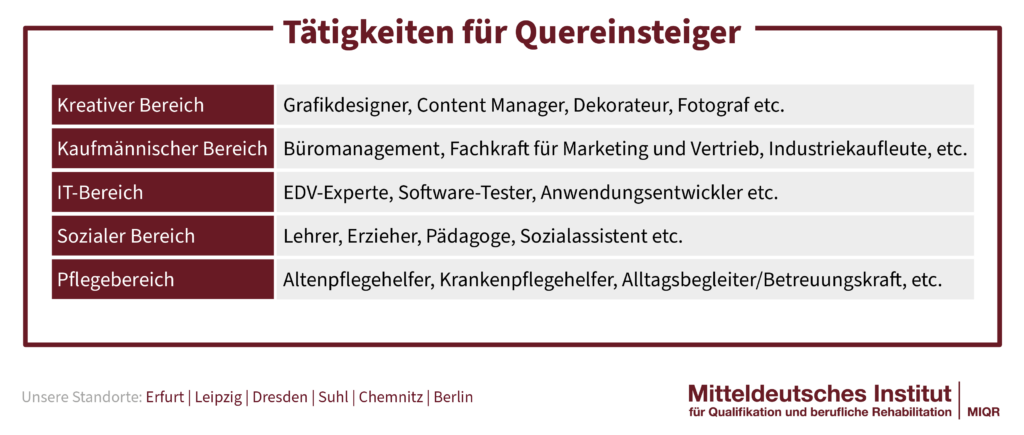
What entry options do career changers have?
Is it clear to you that you would like to pursue a different activity and you have already decided on a new job? Now the question arises as to how best to implement your new entry. In general, you have three options:
- Classic vocational training: This is the longest educational path and is actually only suitable for those who have previously worked without an official professional qualification. In this way, you can catch up on your initial training and secure a recognized qualification.
- Retraining: This form of professional reorientation is also referred to as "shortened second training". It is aimed at anyone who has already completed initial training (apprenticeship or studies) and is now aiming for a different career path. An official professional qualification can also be obtained here.
- Vocational qualification measure/further training: This includes both helper training and further training courses that qualify for taking on a new job. This is the quickest way to make lateral entry possible.
Important: In order to create a successful lateral entry, it is always advisable to be able to prove job-related previous knowledge and qualifications. So if you want to completely reorient yourself professionally, you should look for a suitable training measure that you can use to prepare for your career change.
Become a successful lateral entrant via the MIQR
Are you looking for a reliable educational partner who will accompany and actively support you on your way to a successful career change? We from Central German Institute for Qualification and Vocational Rehabilitation (short: MIQR) are at your side with a concentrated reservoir of specialist knowledge.
What the MIQR stands for
Our name already reveals what our mission as an educational institution consists of:
- Through us you can qualify for various activities.
- With us you can carry out professional rehabilitation and realize your successful new or re-entry into professional life.
Our range of qualifications is extensive. We can offer you various solutions, depending on what professional goals you are pursuing and how extensive your prior knowledge is. These options are available to you:
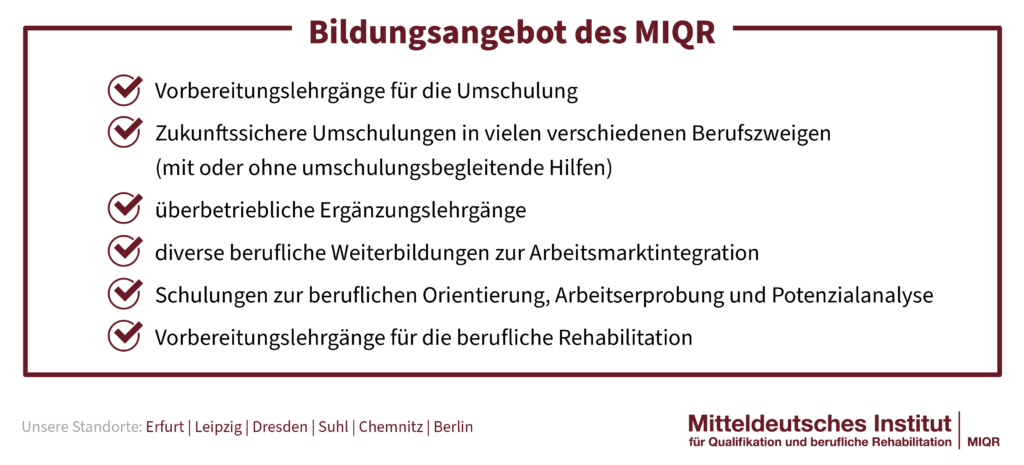
Decide now on the right training course for your career change! The choice of training measure is the first step towards a new professional start. By investing in your vocational training now, you will reap professional success later in working life.
Do you need help choosing a course? We're here to help! Contact us now and together we will find the appropriate training measures that match your interests and goals! Simply make an online inquiry via our Contact form, send us your request by e-mail info@miqr.de or call at 0800 77 89 100, We look forward to you!
What the MIQR offers you
If you want to use your second chance in working life and are aiming for a fulfilling, lucrative career in your dream job, you naturally also want a competent partner at your side to make this dream possible. We'll tell you why you should choose us.
- We are a recognized and AZAV-certified educational institute.
- We are well versed and have years of experience in adult education.
- We have several locations in Germany and also offer many of our courses online.
- We are supported by various payers, eg the employment agency, the German pension insurance, the trade association.
- Our courses can be financed by various grants.
- We guarantee you personal support from our lecturers and consultants.
- Our professional preparation takes place on three levels: sustainable knowledge transfer, practice-oriented competence development, individual advice.
- We offer various support measures, individual assistance and additional services.
You are in good hands with us! We join forces to ensure that you are optimally prepared for your career. For more information, you can of course always ask us personally and find out about our range of services.
We support various target groups – both the unemployed and those looking for work and other people who are interested in education and are looking to change jobs for private reasons.
This is how the MIQR supports you with your lateral entry!
- Direct contact person
- Personal, individual care
- Holistic professional preparation
- Supporting offers of help for more self-confidence and a good career start
How can you finance and promote lateral entry?
The options open to you for financing your lateral entry largely depend on which vocational training measure you have completed. Depending on whether you have undergone retraining or further training, there are various contact persons available to you. We will show you here what they are.
grants for retraining
Retraining is very expensive. This typically lasts two years full-time. Since no remuneration is paid here, retrainees usually have no source of income. They are dependent on funding from a payer. Fortunately, many institutes and authorities are committed to vocational training and support those affected during the professional reorientation phase. Which cost bearer is your right contact person depends of course on your individual situation.
- employment agencies and Job centre support the unemployed and job seekers who want to qualify for a new job through retraining. Funding is provided through a education voucher , or Activation and placement vouchers (AVGS).
- The German pension insurance (DRV) offers services to enable participation in working life. Your support is aimed specifically at people whose employment is threatened by a serious illness or disability. The funding also includes vocational training, insofar as it serves to return to working life.
- trade associations are the carriers of the statutory accident insurance and support those affected who can no longer stay in their old job after an accident at work or due to an occupational disease. They finance and support, among other things, vocational rehabilitation measures and training for labor market integration.
- The municipal social association (KSV) supports people with disabilities so that they can still participate in professional life. Even those who are threatened by a disability and can no longer carry out their previous job are entitled to funding in order to plan their lateral entry. It should be noted that the services can only be claimed in Saxony.
- The Vocational Advancement Service (BFD) promotes "temporary soldiers" (SAZ), volunteers doing military service (FWD) and career officers up to the age of 41 who want to pursue civilian work after their term of office and qualify for the new job.
- state administrative offices can also be considered as cost bearers. (Of course, it always applies here that you should contact the office responsible for your own federal state with the application for funding.) Similar to the DRV, funding is provided to ensure participation in working life. However, the target group is different. The services are aimed at former conscripts who were victims of armed conflicts or physical and psychological violence.
Subsidies for further education
Work trials, orientation measures and professional training can also be (co-)financed via special payers. The support offers are also aimed at specific target groups, so that you have to decide, based on your personal situation, which funding agency has the best chance of success with a funding application.
- Employment Agency and Job centre appear here again as cost bearers. The requirements for funding are similar. Support is given to unemployed and job-seeking people who want to get back on their feet professionally. Here, too, the training voucher or AVGS is handed out with the approval of the funding application, which can then be used to take the desired training measure.
- State and federal programs are attractive for all those whose application for funding was rejected by the employment agency or job center. The reason for this is often that their desire for professional reorientation was not seen as a necessity but as self-interest. They are therefore considered to be “self-payers”. However, the federal states provide their own funding measures and grants to support those who want to study.
So that you can get a better overview of the specific funding opportunities in your federal state, we have you covered here an overview of all current funding programs.
Top 5 tips for a successful lateral entry: How to improve your chances
Every success needs to be well planned. We will now explain in detail how you too can promote your chances of lateral entry.
1. Define your own goals
If you are planning a career change, you need to know where the journey is going. To do this, go through the questionnaires that we offer you under the chapter "How does a lateral entry succeed? - You have to clarify that beforehand" have put together. Lateral entry is a second chance for professional happiness. So deal intensively with what interests you, where your strengths lie and what you expect from your new job. Changing jobs should never happen on a whim. So take the time to be clear about your own goals.
Tip: Ask yourself whether you are dissatisfied with your work in general or just with your current working conditions. In the latter case, a change of employer is usually the right solution.
2. Acquire knowledge
Have you found a job that interests you and is also being sought on the job market? Congratulations! Now you have to clarify which requirements you have. Do you already have previous knowledge or experience in the industry? If not, then you should definitely acquire basic specialist knowledge in order to score points in your application. Research which educational opportunities you can use to advance your lateral entry. Depending on how sophisticated your prior knowledge is, either a refresher course, in-depth training, professional development or retraining makes sense.
In your application, be sure to indicate that you prepared in advance for the new job to have. This is how you prove yours ambition and initiative – Qualities that are highly valued by an employer.
3. Train soft skills
Soft skills are becoming more and more important in today's professional life - especially for career changers. For applicants who originally come from a different profession or even a foreign industry, it is crucial to know their own strengths and to communicate successfully. It is important that you present yourself well in your application and in the interview. A confident appearance, communicative skill and sociability are very well received. Also organizational skills and Flexibility in difficult or complex situations earn plus points. However, you must also be able to prove these skills in some way. Explain when and how you applied these qualities—whether it was in school, during college, or in your previous job. You should present your strengths of character as meaningfully as your qualifications and expertise.
4. Demonstrate resilience
It is also advisable for all newcomers to resilience and willingness to learn to prove. As a newcomer from outside the industry, you must expect that you will be confronted with a lot of new knowledge in the company. In order to increase your chances of a successful lateral entry, you should also deal with your new task outside of official working hours and independently hone your skills development.
5. Build references
Practical experience and good reviews are one of the most important aspects in a job interview. Don't hesitate to use every experience to prove your qualities as a future employee. suit you positive job references before or good reviews from previous internships or volunteer services? Do you have any other awards, certificates or proof of achievement? Gather everything together and attach these documents to the application. In order to increase your references, you should definitely complete one or more internships during your professional training. These are often offered in conjunction with the theoretical training and give you a very good opportunity to demonstrate your skills and get recognition for it. Be sure to request this in writing, or at least ask if you can Name company as a reference allowed.
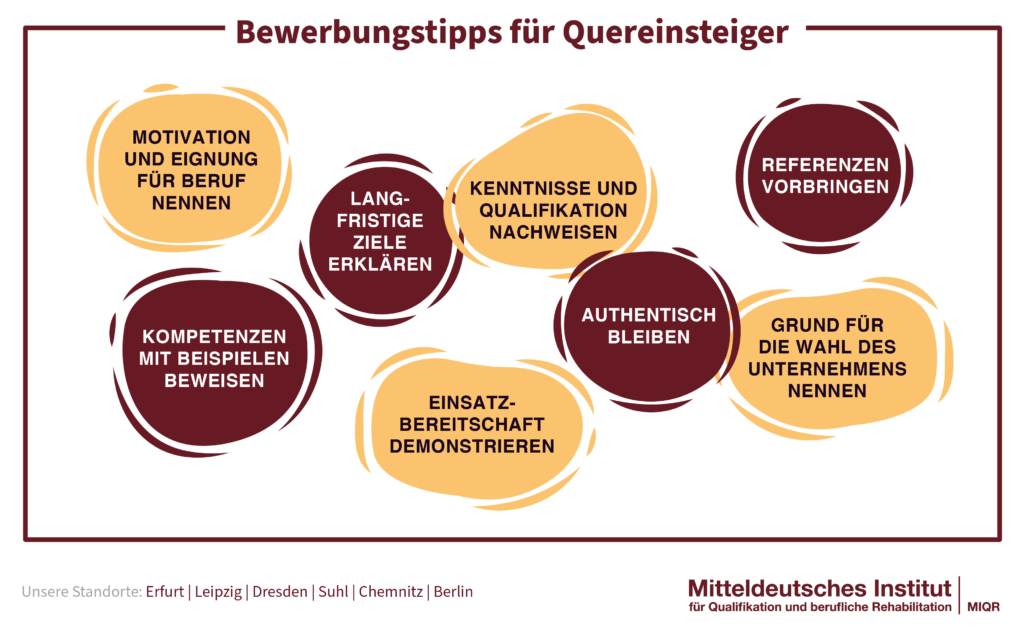
How much do career changers earn?
The earning potential after lateral entry depends on various factors:
- What is your job?
- What is your educational background?
- Do you have any other qualifications?
- What is your professional experience?
- What industry did you enter?
- How big is the company you work for?
- In which region is the company based?
Once you've got your start in your new job, you can create a stable foundation through your drive to ask for a raise in a reasonable amount of time. Usually, after about a year, you can inquire about a financial top-up. There are good prospects of a salary increase if you show initiative in the course of your career and also (want to) take part in further training. If your employer sees that there is potential for further development in you, he is also more inclined to invest in you.
We will give you more tips and advice on conducting successful salary negotiations in our topic article.
Up to what age does lateral entry make sense?
In principle, lateral entry is possible at any working age, regardless of whether it is 20, 30, 40 or 50. However, as people get older, they seem less willing to change their professional situation – even if it is no longer fulfilling. A job or employer change usually only comes about if the previous job is uncertain and unemployment is imminent.
Job dissatisfaction or a fundamental interest in another job rarely motivate experienced employees to reorient themselves professionally. Habit and the countdown to retirement prevent many from showing initiative and reaching for their own professional happiness again. It is never too late to reorient yourself and strive for your personal dream job. There are also interesting opportunities for a successful career change at 40 and 50+.
added: Changing jobs over the age of 50 is more difficult than for those just starting out. This does not mean that applications from this age are not worthwhile. However, these involve more effort. Your cover letter and resume must effectively showcase your work experience. It is advantageous if you can prove that you have up-to-date specialist knowledge. As soon as you have successfully completed a measure for professional reorientation, this point is already fulfilled. The quality of the application also plays a crucial role, especially since most documents are now set up digitally and no longer on printed paper. If you are not sufficiently familiar with the computer writing programs, you should attend a training course. Ultimately, you will benefit from this, because complete, excellently prepared documents make an impression on employers.
The MIQR carries out special communication and job application training to accompany retraining and professional development. Our goal is to take away your fear of the application process. With interactive exercises and tips on what is important in a job interview, we effectively prepare you for your job placement.
In order to make a successful lateral entry at the age of 40 or 50+, you should consider the following aspects:
- Set realistic requirements for your new job.
- Check whether the position you are looking for is being sought on the job market.
- Also look for alternative fields of activity and do not just focus on a single job.
- Consider whether you can score with experience from previous jobs or honorary posts or whether an additional qualification makes sense.
- Reflect on whether your industry knowledge is up to date.
Summary
A professional reorientation is a big decision that should not be taken lightly. Clarify with yourself whether a change of employer or another area of responsibility can improve your professional situation. Through appropriate further training, you can gain additional qualifications and strive for specialization in your industry. Especially if you work in the commercial area, you have numerous opportunities for professional change - without having to change your job completely.
The situation is different if your old job does not bring you any fulfillment and offers no prospects. Retraining or further vocational training gives you a second chance to find a new job and make a career for yourself. You can get off to a good start as a career changer – you just have to plan your career start properly! With our tips, we give you a guide to help you with your career planning.
We are at your disposal as an experienced training provider if you are looking for a suitable vocational training measure! If you are interested or have any questions, you can contact us directly via e-mail, contact form or telephone. Start your success story with us - we look forward to seeing you!
If you found this post helpful and would like to keep up to date with the latest news about the Central German Institute, visit us now on our official Facebook page or follow our Instagram account. So you always stay up to date!
If you have any questions about our offer or would like personal and individual advice, please send us an inquiry.















